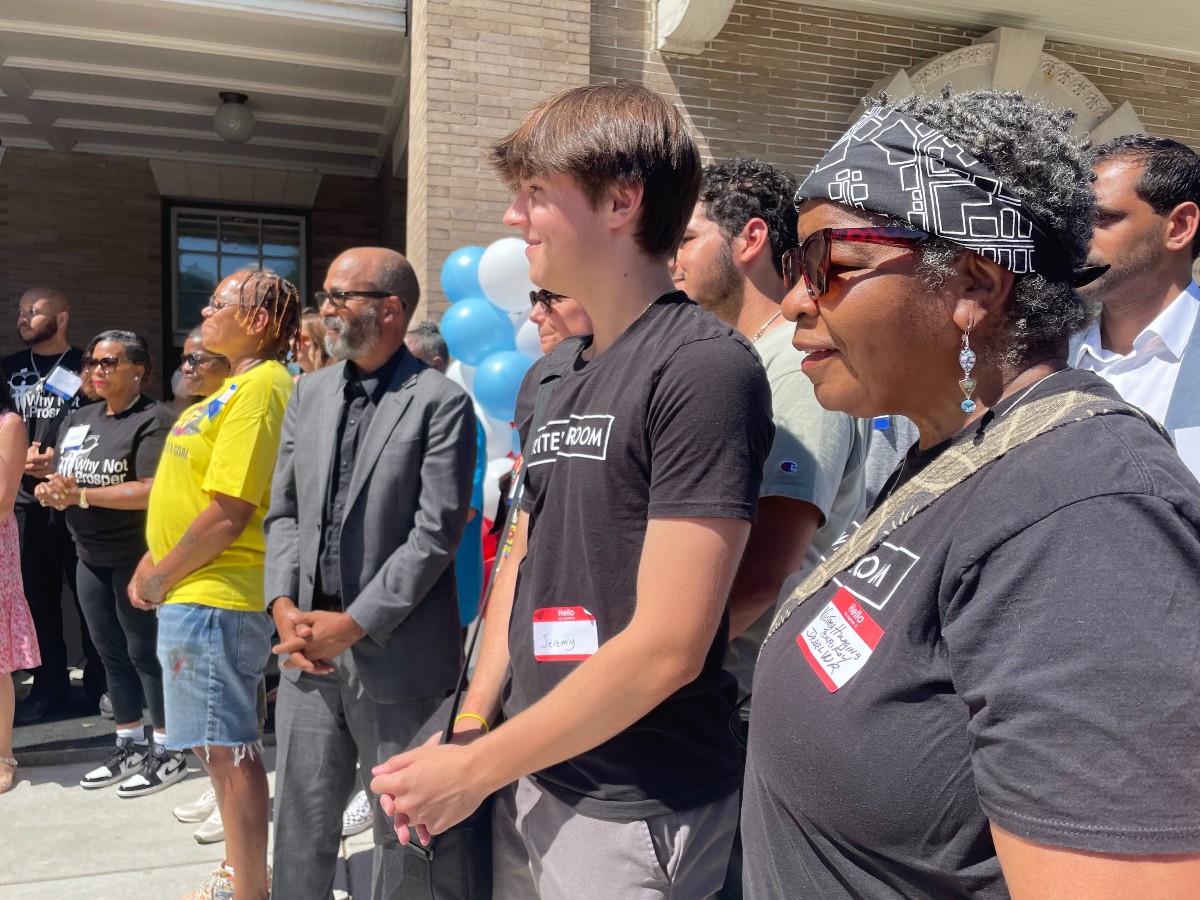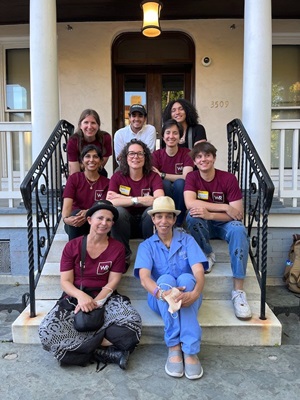Finding Your Place in the Community with Writers Room
By Sarah Hojsak

Jeremy D'Amico with Charles Lomax (Chairman & CEO, Lomax Real Estate Partners) and Victoria Huggins Peurifoy (Community Engagement Liaison, Writers Room) at the Philadelphia250 semi-finalists announcement, where Second Story Collective was among the 11 projects selected for funding.
December 9, 2022
When Jeremy D’Amico, political science ’24, decided to come to Drexel, he didn’t think much about what living in a city like Philadelphia would involve. He quickly became absorbed in his studies and paid little attention to the community surrounding campus—until he started a co-op with
Writers Room.
“I was in my own world,” D’Amico, who grew up in Rhode Island, recalled. “With Writers Room, I actually got to see all these people who are part of this community. It was eye-opening.”
 Members of the Writers Room team, led by Founding Director Rachel Wenrick (center), celebrate Anthology 8 at the Dornsife Center for Neighborhood Partnerships.
Members of the Writers Room team, led by Founding Director Rachel Wenrick (center), celebrate Anthology 8 at the Dornsife Center for Neighborhood Partnerships.
Writers Room functions with a small but passionate team. Founding Director Rachel Wenrick has big plans for the university-community literary arts program, one of Drexel’s hidden gems. Deeply rooted in the West Philly neighborhood surrounding Drexel, Writers Room brings together a diverse collective of students, faculty, staff, alumni and local residents with a mission of developing “inclusive, intergenerational, co-creative places that foster connection and community.” All programming is free and open to everyone.
Some of Wenrick’s vision was made possible this spring and summer when D’Amico came on board. The co-op was one of 10 funded by the Dean’s Excellence Fund in the College of Arts and Sciences this year, designed to give hands-on experience while providing faculty with resources to help further their goals.
“When we had the opportunity to expand our team with a full-time paid co-op student through the Dean’s Excellence Fund, it was a perfect match,” Wenrick said. “We are a center of the College of Arts and Sciences, but because our work is very public facing, people can miss how much of what we do is central to the CoAS mission. This was another way to create a deep learning opportunity for an exceptional student.”
D’Amico was drawn to the co-op because of his interest in social justice, on which Writers Room places a strong emphasis. He worked on public programming and events, grant applications, and research to help develop long-term projects including a potential future major that would formalize students’ involvement with Writers Room.
It was important to Wenrick that D’Amico be involved with the full scope of Writers Room’s work. “It's so interdisciplinary. It's experiential to the point of being immersive,” she explained. “Everyone is a student. Everyone is a teacher. Learning happens in all directions.”
Throughout the six months they worked together, Wenrick encouraged D’Amico to “capture the learning as it’s happening.” She explained that in any job, it’s easy to get caught up in day-to-day tasks and miss the bigger picture of what you're working toward. “Sometimes you’re so busy you don’t always realize how you’re contributing. The implications are huge.”
D’Amico contributed to applications for major grants Writers Room partners on with Dr. Ayana Allen-Handy’s Justice-Oriented Youth Lab in the School of Education. His work was crucial to securing funding from AmeriCorps and the National Science Foundation that will help Writers Room and JoyLab develop Second Story Collective, an intergenerational approach to co-living, into a transferable model for other university-adjacent communities across the country.
He also collaborated with partners across the University on research for a potential new major rooted in civic engagement and social justice, which has been a goal of Writers Room for several years.
“We’ve seen students create their own second major through the different learning experiences that Writers Room offers,” Wenrick said. “We want to formalize that for students who are seeking an interdisciplinary, immersive experience that has a social justice focus and that complements any course of study.”
A central question of Writers Room’s work is “How can we affect change together in partnership with our neighbors?” Wenrick hopes that through their involvement with Writers Room, students will understand how universities can be agents for good in their communities, and how we can set an example here in CoAS and at Drexel at large.
"When you come to Drexel, you might not fully understand the neighborhood that you’re coming into and how you’re part of this ecosystem,” Wenrick explained. Through the co-op, she says D’Amico was “able to contribute to affecting positive change and creating a model that could be implemented across the country.”
D’Amico's co-op is exemplary of what a liberal arts education can do. It helped him develop his communication and interpersonal skills and taught him more about what it takes to run a nonprofit: how it operates, how it secures funding and how it builds an engaged community. It also helped him realize his place within the community and how that can shape his future career.
“The community aspect of this co-op was the biggest thing that shocked me,” D’Amico said. “I realized I’m not just a Drexel student, I’m part of the West Philly community. That's something I’m taking with me in my studies, too. I'm continuing to think of Drexel through a community lens. This is not just an isolated bubble.”
D’Amico always knew he wanted to pursue a career in politics but wasn’t sure whether he could make the biggest difference locally or nationally. After his co-op with Writers Room, he says, "I've realized that solutions to social problems need to be addressed on a local level. Solutions have to come from the community, and then from there they can be elevated. You have to see how they are going to affect the people in the community.”